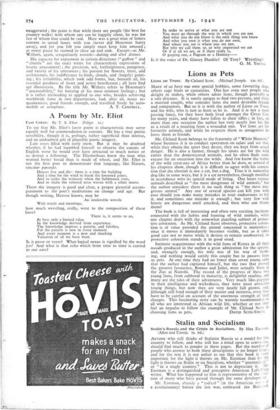A Poem by Mr. Eliot
East Coker. By T. S. Eliot. (Fabpr.
To say that Mr. Eliot's latest poem is characteristic may serve equally well for commendation or censure. He has a true poetic sensibility, though it is, perhaps, rather superficial than intense, and an undoubted gift of plausible poetic imagery.
Late roses filled with early snow. But it may be doubted whether, if he had humbled himself to observe the canons of English verse he would ever have attracted so much notice or so devout a following. The Elizabethans knew the man who wanted better bread than is made of wheat, and Mr. Eliot is not the first poet to demonstrate that language, like Nature, vincitur parendo.
Houses live and die: there is a time for building And a time for the wind to break the loosened panes, And to strike the wainscot when the fieldmouse trots, And to shake the tattered arras woven with a silent motto.
There the imagery is good and clear, a proper pictorial accom- paniment to the poet's meditations on change and age. But though writing, Heaven knows, may be An intolerable wrestle With words and meanings, how much wrestling, really, went to the composition of these lines?
At best, only a limited value In the knowledge derived from experience. The knowledge imposes a pattern, and falsifies, For the pattern is new in every moment And every moment is a new and shocking Valuation of all we have been.
Is it prose or verse? What logical nexus is signified by the word for? And what is that echo which from time to time is carried to our ears?
There is, it seems to us, In order to arrive at what you are not You must go through the way in which you are not And what you do not know is the only thing you know And what you own is what you do not own, And where you are is where you are not, But why we call them so, or why impressed we are Or if at all we are, or if there really is, O gasping one, a Pogram or a HominyIs it the voice of Dr. Ginery Dunkle? Of Troy? Wrestling?
G. M. YOUNG.


























 Previous page
Previous page